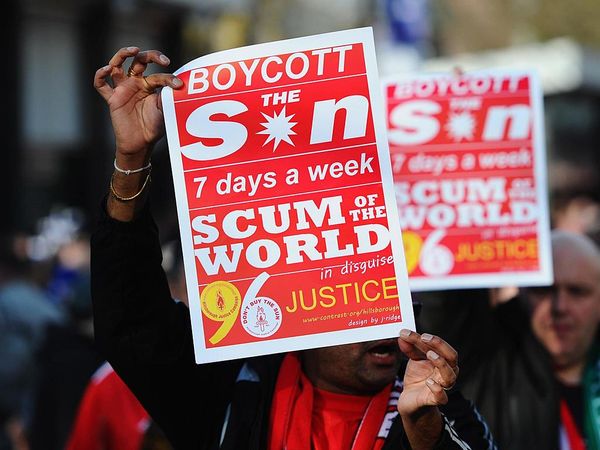
No one surely believes that when a newspaper tells its readers ahead of an election how to vote they simply do as they are told. There is no evidence whatsoever to show a direct correlation between what is published and what happens at the ballot box.
Instead, media academics who have tried to divine the political impact of the press during elections, particularly the populist tabloid variety, have found it necessary to untangle a complex web of influences in order to explain why people voted as they did.
Now, as if proving a positive wasn’t difficult enough, two academics have sought to prove a negative. Rather than arguing that readers of the Sun voted leave on the basis of their paper’s passionate pro-Brexit campaign, they want us to believe that not reading the paper contributed to a pro-European Union vote.
Florian Foos and Daniel Bischof have produced research that claims that Euroscepticism in Liverpool gradually subsided during the course of the city’s 30-year boycott of the Sun. Therefore, they claim, it was the absence of the Sun that resulted in a pronounced switch by Liverpudlians in favour of remaining in the EU.
Foos, an assistant professor in political behaviour at the London School of Economics, and Bischof, a senior political science researcher at Zurich University, do have the good grace to call their approach “quasi-experimental”. So, clearly, they know they are going out on a limb.
Before I saw off their branch, here’s the gist of the argument. After the Hillsborough tragedy in 1989, in which 96 Liverpool football fans died in a crush, the Sun wrongly accused the fans of being responsible for the deaths. It prompted many people on Merseyside to stop buying what was, and is, Britain’s best-selling daily. Spontaneous outrage turned into a long-term boycott. With several newsagents refusing to stock the Sun, it is estimated that sales fell by more than 40,000 a day and never recovered.

Some Sun boycotters stopped reading a paper altogether. Most of the others, according to the research, switched to the Daily Mirror – the only one of the popular papers to support Britain’s EU membership. In other words, they were relieved from the relentless anti-EU agenda of the Sun from the 1990s onwards and subsequently, following the opening proceedings for the referendum in 2015, its pro-Brexit propaganda.
According to Foos and Bischof, prior to Hillsborough the people of Liverpool, and the wider region of Merseyside, were generally Eurosceptic. Indeed, they were more anti-EU than 21 English counties with similar working-class demographics.
Yet in their analysis of the 2016 referendum voting pattern, they found that residents in the city of Liverpool “voted significantly more remain than the rest of England” (58.2% in fact) while those across Merseyside as a whole showed “a slight edge for remain”. The Merseyside vote was 51% to 49% in favour of staying in the EU.
In their view, this outcome suggested it was the boycott of the Eurosceptic Sun that “led to a decrease of Euroscepticism in Merseyside, which we estimate to amount to around 11 percentage-points”.
That’s a bit of a leap of faith. They cannot be certain that the non-Sun factor was the major determinant of the pro-EU vote in Liverpool. Note, for instance, that neighbouring Manchester, where no Sun boycott took place, voted 60.4% remain.
Moreover, their notion that switching to the pro-EU Mirror could have made a difference is entirely nonsensical. As the senior editorial staff of the Mirror privately conceded, once the referendum was called they played down their once wholehearted support for the EU precisely because their readership was so skewed towards Brexit. A large slice of the Mirror’s audience voted leave.
But I do think the study indicates the possibility that a non-Sun diet might have had some influence on the vote. Although the academics only touched on it, I imagine that such was the depth of the city’s antipathy to the Sun and all it stood for that Liverpudlians were motivated to vote against anything it advocated.
Foos and Bischof also argue that their study “shows that sustained media campaigns on emerging issues can have large, lasting, and ultimately, consequential effects on public opinion, and public policy”. While I’m uncertain about whether they have proved that with this particular study, I’m with them on the general point.
Newspaper campaigns succeed by repetition over a prolonged period. Influence on public opinion takes place over years rather than as the result of a single political intervention. Turning that on its head, as the authors do, it could therefore be argued that the failure to be subjected to such a campaign also has an effect. Maybe, maybe not. This study doesn’t prove their argument but it’s an interesting case that suggests we should examine the lasting impact of the worldview of newspapers.
• Roy Greenslade is professor of journalism at City University and a Guardian columnist










